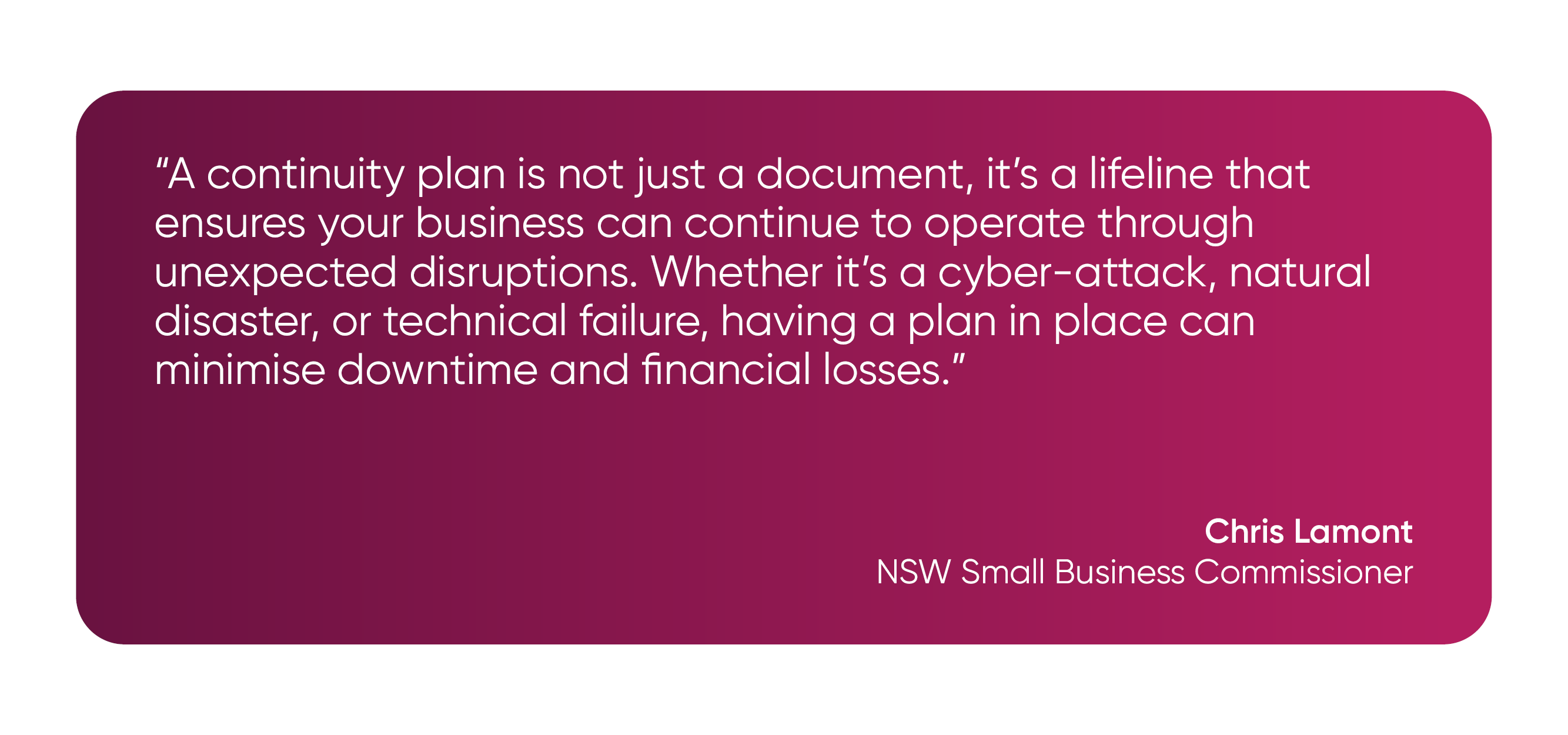Why contact centres are the key to a future-proof business continuity plan
When organisations plan for business continuity, considerations like IT systems, financial safeguards, and physical infrastructure are generally front of mind. However, continuity strategies often overlook one critical element: the contact centre. As the first line of communication during crises, contact centres play a pivotal role in maintaining customer trust and operational stability.

Why is business continuity important?
Business continuity planning works to ensure operational stability during and after disruptions. Unlike reactive disaster recovery, it’s a proactive strategy that safeguards workflows, customer relationships, and financial resilience. The global COVID-19 pandemic demonstrated the devastating cost of being unprepared, with many organisations scrambling to adapt and maintain operations.
This disruption has continued into subsequent years, with research by BCI showing that almost 80% of organisations’ supply chains were disrupted in 2024. The ripple effects of these interruptions have underscored a harsh reality: businesses can no longer afford to operate without robust continuity plans.
“A continuity plan is not just a document, it’s a lifeline that ensures your business can continue to operate through unexpected disruptions,” says NSW Small Business Commissioner Chris Lamont. “Whether it’s a cyber-attack, natural disaster, or technical failure, having a plan in place can minimise downtime and financial losses.”
While companies that prepare proactively are protecting their assets, they’re also positioning themselves as reliable partners in uncertain times.
Contact centres: The voice of the business
During a crisis, customers seek immediate answers and reassurance, whether in response to natural disasters, data breaches, or unexpected service disruptions.
The contact centre becomes a powerful tool for:
- Managing customer expectations: Customers value timely, accurate information during uncertain periods. As TSA Group CEO Luke Kenny notes, “When disaster strikes, customers call—so having a plan to manage surge capacity should be part of your continuity planning.” Prepared contact centres ensure customer queries are managed efficiently and effectively, maintaining trust and reducing reputational risks.
- Protecting brand reputation: A contact centre doesn’t just represent the business—it is the business in the eyes of customers. And they will form an opinion about the brand based on their experience of the contact centre. For TSA Group, providing a rapid response in the aftermath of the CrowdStrike software update disruption (which impacted global Windows systems) ensured minimised disruptions and reinforced client confidence.
- Real-time adaptability: Customer needs evolve quickly during crises, and a contact centre is uniquely positioned to capture this feedback in real time. Blaine Slater, Chief Customer Officer at TSA Group, says these insights are invaluable: “If you want to transform the business, you need the data and insights that flow through a contact centre every day. You can look at demand, sentiment, and NPS [Net Promoter Score] figures, and that’s going to inform and guide your strategy.”
Technology is vital for outpacing evolving threats
From infrastructure tools that keep systems running smoothly to customer engagement platforms that enhance experiences, research by Gartner indicates modern contact centres are powered by innovation. With the integration of advanced technologies allowing them to provide consistent service, regardless of disruptions to physical locations or traditional workflows.
- Cloud-based solutions: Cloud platforms empower contact centres to continue operations remotely, ensuring uninterrupted service even during office closures. The pandemic was a prominent example of how vital and powerful cloud-based solutions can become; however, they can also be used when staff are displaced during natural disasters. These systems enable remote work, real-time updates, and secure data access, so businesses can stay agile and adaptable in challenging situations.
- AI and automation: Tools like chatbots and virtual assistants streamline routine queries, providing shortcuts like automated scripting that save agents from reading out lengthy terms and conditions—giving them more capacity to manage the influx of demand during major disruptions. Meanwhile, predictive analytics can identify customer needs and trends, allowing businesses to be more proactive in their solutions.
- Omnichannel communication: Modern customers expect consistent service across all channels, from email and phone to live chat and social media. Omnichannel platforms unify these touchpoints so customers can switch channels without losing context. This ensures seamless, personalised interactions, even when disruptions occur on specific platforms. For example, customers might lose their internet connection during a power outage, but businesses could proactively send out SMS updates in the meantime.
The strategic value of outsourced contact centres
Outsourced contact centres are external providers that handle customer interactions remotely, offering businesses access to specialised teams and advanced technology without the need for significant internal resources. This service helps businesses ensure scalability for surges in customer demand, avoid the constraints of local staff shortages through access to the global talent pool, and mitigate operational risk by reducing dependency on a single site.
Building a resilient future
Contact centres are the lifeline of customer communication during times of uncertainty. By prioritising them as a core element of business continuity planning, organisations can position themselves as reliable, customer-centric partners and significantly reduce the impact of unexpected events.
Are your contact centres ready to proactively respond during future crises? If you’re interested in building a future-proof plan that ensures your business thrives in uncertainty, speak to the expert team at TSA Group.

















